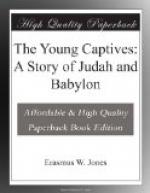The three brothers, in their spheres, performed their duties with a degree of perfection and exactitude that greatly pleased the king; and for this, more than on account of their genuine excellence, were they regarded by him in a favorable light. Those pleasing qualities so apparent in the earlier history of the king were fast disappearing, to give way to pride, vanity, peevishness, and even cruelty.
The bold and impetuous declaration of the king, in regard to the sovereignty of the God of Israel, and the peculiar circumstances under which the poor Hebrews were promoted, were far from being forgotten by the Babylonians. There was a deep and abiding dissatisfaction in the minds of thousands in the realm, not so much on account of the elevation of the Hebrews, as on account of the conviction that the sovereign was not a sincere worshiper of the gods of the empire. The king, by occasional remarks from his nobles, had noticed more than once that there was something in their language that indicated a lack of confidence in his fidelity to the gods. Nebuchadnezzar, notwithstanding his increasing vanity, was far from being indifferent to the estimation in which he was held by his subjects. He knew that his safety was based on the confidence and friendship of his people, and he was determined, if by his former professions he had unwisely magnified the God of Daniel, and thereby lost the confidence of his Chaldean subjects, to give them unmistakable proof that he still was a worshiper at the shrine of Belus.
Summoning Belrazi, one of his most trusted officers, to his side, the king said:
“From the nature of thy position, thou art called to mingle in very numerous circles, and no man at the palace is better qualified than thou to judge of the feelings of the subjects toward their king. Come, now, be frank and plain with thy sovereign, and tell me how I stand in the estimation of my nobles.”
“O king, live for ever!” replied the officer, highly delighted with this unusual mark of the king’s confidence. “Thou livest in the warm affections of thy nobles, and in the pure regard of all thy numerous subjects. Thou art the peculiarly favored of the gods. All the nations of the earth fear thee, and pay their homage at thy feet.”
“True. But art thou not aware that on one point my subjects are not as fully satisfied with their king as they might be? Behold, I have placed unusual confidence in my servant, and in return the king requireth equal sincerity.”
“As thy soul liveth, O king, I shall hide nothing from thee. In mingling with thy nobles, I find that, without distinction, they are abundantly loyal. In a very few instances I have heard language that indicated that my lord the king was favorably inclined toward the God of the Hebrews, and less ardent in his devotion to the gods of Chaldea. But in this, has not my lord the king the perfect right to do as seemeth good in his sight?”




